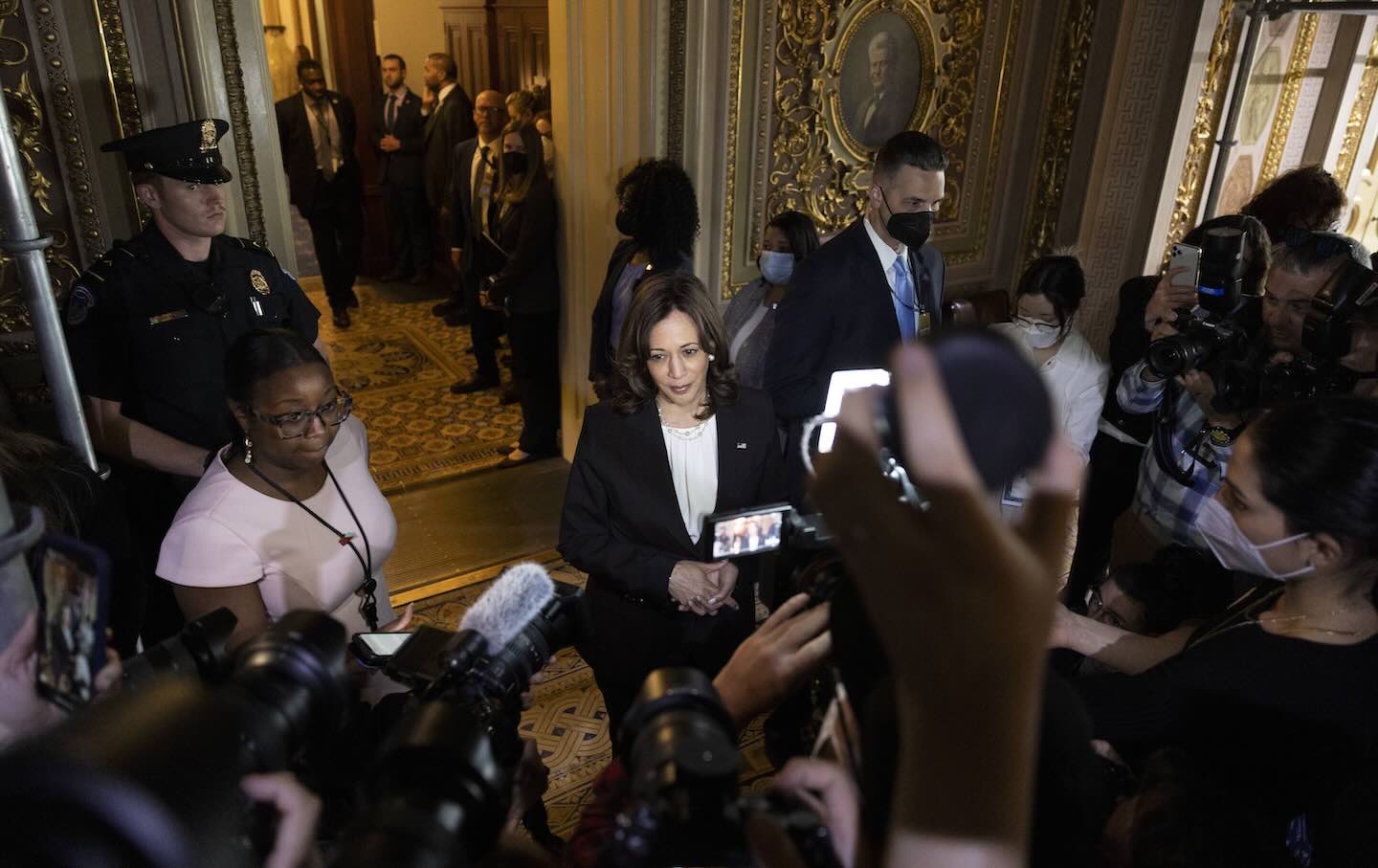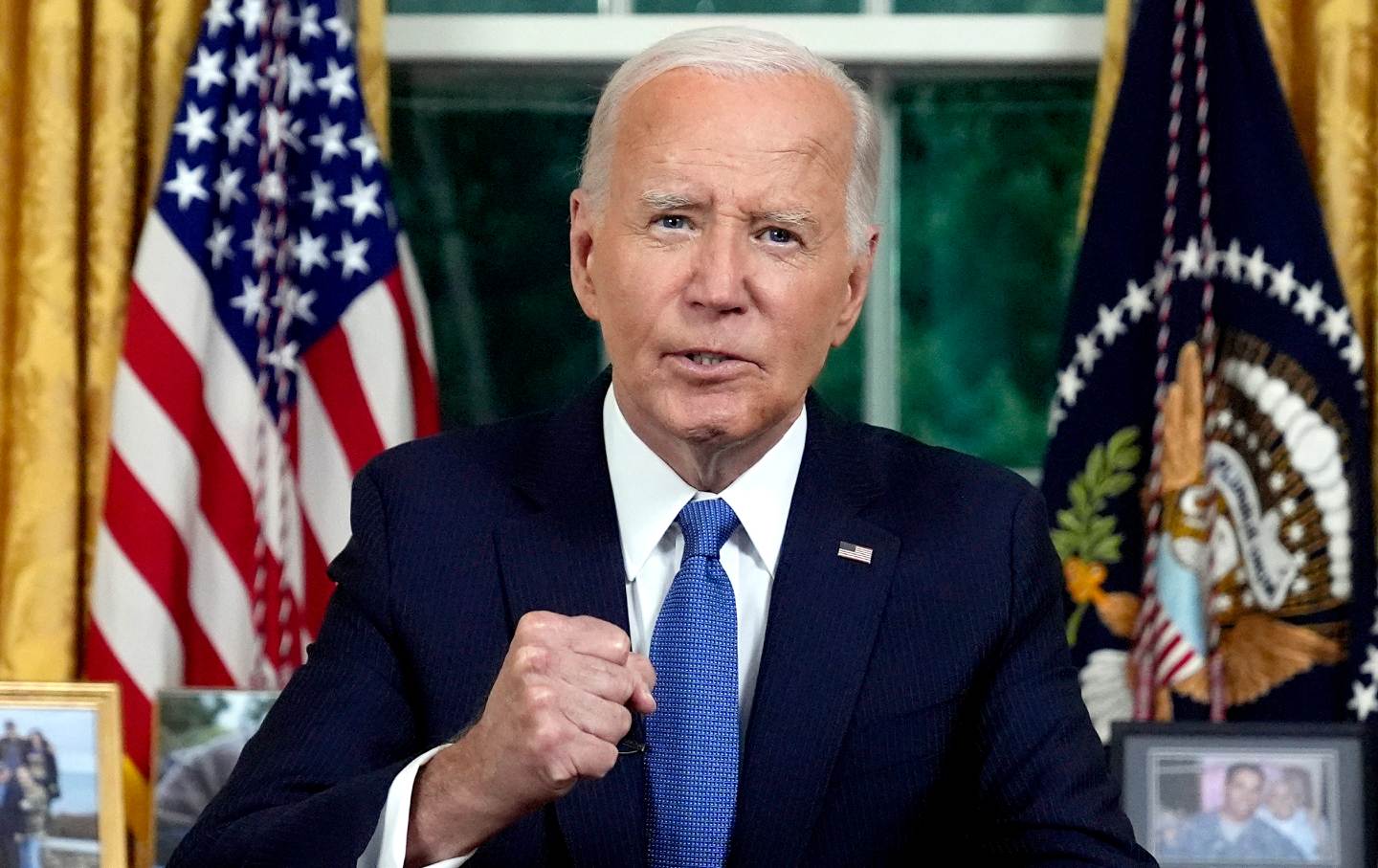
The nomination gives the presumptive Democratic presidential nominee a second ballot line in New York and a big organizational boost from WFP and its allies.
A supporter holds a sign as members of the San Francisco Democratic Party rally in support of Kamala Harris on July 22 at City Hall in San Francisco, California.
(Photo by Loren Elliott / Getty Images)
Vice President Kamala Harris’s presidential campaign has secured enough endorsements from Democratic National Convention delegates to assure that she will be the party’s nominee in the 2024 race against the GOP’s nominee, Donald Trump. But she’ll have to wait until sometime in August to be formally nominated, following a virtual vote, which will be scheduled on or around August 3 in a move that the Democratic National Committee says is needed in order to assure that she will meet state requirements to appear on November ballots. Harris will then be nominated again, in a ceremonial roll call at the August Democratic National Convention in Chicago.
But the presumptive Democratic presidential nominee will not have to go through all the steps outlined by the DNC to appear on the ballot in one state. On Thursday, the Working Families Party embraced Harris as its candidate, giving her the party’s influential ballot line in New York. In addition, the third party, which has a major presence in states across the country, will be organizing for Harris nationwide.
Arguing that “we cannot let Donald Trump and MAGA extremists return to power,” WFP national director Maurice Mitchell announced its endorsement. “Our members, chapters, and party leaders have voted overwhelmingly to support VP Kamala Harris as the next Democratic nominee—with 95 percent of the total vote in favor of the endorsement,” said Mitchell.
Thanks to a New York law that allows for the fusing of votes cast for the candidate of different parties into a single total, the votes Harris wins on the Working Families Party line will count toward her overall vote in that state and nationally. In Oregon, another state where the WFP has ballot status but a slightly different system for listing party endorsements, Harris will appear on a single ballot line with the names of both parties listed as supporting her. In a number of other states where the third party is active, including Connecticut, she will run on the Democratic line, but with active support from the WFP’s well-organized political operations.
The WFP endorsement didn’t get as much attention as some of the other shows of support for Harris in recent days, especially Friday’s message from former President Barack Obama that he and former First Lady Michelle Obama will “do everything we can to get you through this election and into the Oval Office.”
But it is worth noting that Harris has received an important boost from the WFP, which over the years has often provided the winning margin for Democratic candidates running in New York. WFP votes have also boosted the state and national vote totals for the Democratic presidential candidates it has endorsed in recent election cycles. For instance, in 2020, of the 5,244,886 votes cast in New York for President Joe Biden and Vice President Harris, 386,613 were counted on the WFP line.
The party has long been influential in New York politics. For instance, New York Attorney General Letitia James got her start as a WFP-endorsed candidate for the New York City Council in 2003—becoming the first New York City officeholder to run and win solely on the WFP line. She has twice been elected as attorney general with combined support from the WFP and the Democrats. Senate Majority Leader Chuck Schumer was reelected in 2022 with 297,739 WFP votes—almost ten percent of his total. In legislative and congressional races, the WFP has often provided the votes that were needed to secure wins for Democrats who would otherwise have lost.
One of the benefits for Democratic candidates who earn the WFP endorsement is that it provides an avenue for voters who may not agree with the candidate on every issue to offer support while at the same time sending a message regarding the need to move toward more progressive positions. That could happen this year, when many voters are enthusiastic about Harris’s candidacy but remain deeply frustrated with the Biden administration’s support for the Israeli assault on Gaza.
Noting their enthusiasm to endorse Harris and the Biden administration’s achievements, including economic gains for working families, the New York Working Families Party’s co-directors, Ana María Archila and Jasmine Gripper, emphasized the hope that Harris would move toward “turning the page on the United States’s disastrous support for the human rights abuses in Gaza,” while advancing a progressive agenda. In addition, said Archila and Gripper, “Voting for Kamala on the WFP ballot line is how New Yorkers can reject Trump and his MAGA agenda, while demonstrating their support for women’s rights and higher taxes on the ultra-rich.”
The WFP endorsement also provides an organizational boost for Harris, as the party works closely with major unions and grassroots groups. The WFP operates in key states across the country—including in battleground states such as Pennsylvania and Wisconsin—to mobilize turnout among working-class voters, especially people of color, labor union members, young people, and supporters of bold initiatives to combat racism and sexism, to guarantee health care as a human right, and to combat the climate crisis. In addition, the WFP has a long history of working in close coalition with major progressive groups that organize for economic and social and racial justice nationwide.
The WFP’s announcement on Thursday was coupled with endorsements for the vice president from the Center for Popular Democracy Action and People’s Action. The three organizations have pledged to mobilize their national member bases, which include hundreds of thousands of activists, to knock on more than 5 million doors in Arizona, Michigan, Nevada, Wisconsin, Pennsylvania, and other battleground states.
“The Biden Administration put our country back on track, canceling student debt for close to a million Americans, rebuilding our economy post-Covid, and investing in our infrastructure. Now is the time to rally behind Vice President Harris to build upon those achievements and take on the immense challenges ahead,” said DaMareo Cooper and Analilia Mejia, the co-executive directors of the Center for Popular Democracy Action.
“We see an unprecedented surge of enthusiasm on the doors and from our members about Vice President Kamala Harris,” added People’s Action Movement Governing Director Marta Popadiak. “The Biden/Harris administration created real momentum toward an economy that puts working people before billionaires and a democracy that protects hard-won freedoms for everyone. We need to build on that momentum. That’s why we are mobilizing tens of thousands of volunteers to have deep conversations about why voting for Harris is a vote for a future in which our families and communities will thrive.”
For his part, Mitchell says, “Our coalition was critical to defeating Trump in 2020. We’re ready to do it again in 2024.”
Mitchell also issued this important reminder: “This election is bigger than any one person. It’s about the kind of country we want to be and whether we will let the rights and freedoms our ancestors spent generations fighting for—the right to participate equally in our democracy, to organize our workplaces, and to control our own bodies—be taken away from us.”
The way to do that, argued Mitchell, is by “mobilizing voters in key states to elect Kamala Harris and build our ranks of WFP champions up and down the ballot.”
Thank you for reading The Nation
We hope you enjoyed the story you just read, just one of the many incisive, deeply-reported articles we publish daily. Now more than ever, we need fearless journalism that shifts the needle on important issues, uncovers malfeasance and corruption, and uplifts voices and perspectives that often go unheard in mainstream media.
Throughout this critical election year and a time of media austerity and renewed campus activism and rising labor organizing, independent journalism that gets to the heart of the matter is more critical than ever before. Donate right now and help us hold the powerful accountable, shine a light on issues that would otherwise be swept under the rug, and build a more just and equitable future.
For nearly 160 years, The Nation has stood for truth, justice, and moral clarity. As a reader-supported publication, we are not beholden to the whims of advertisers or a corporate owner. But it does take financial resources to report on stories that may take weeks or months to properly investigate, thoroughly edit and fact-check articles, and get our stories into the hands of readers.
Donate today and stand with us for a better future. Thank you for being a supporter of independent journalism.
More from The Nation

Patriarchy, plutocracy, and ethnonationalism fuel the vice-presidential candidate’s bizarre slur.
Jeet Heer

Since her time as California attorney general, Vice President Kamala Harris has proven to be a tough-as-nails negotiator.
Sasha Abramsky

Wednesday night’s address was moving, and also confirmed that he’d made the right decision.
Joan Walsh